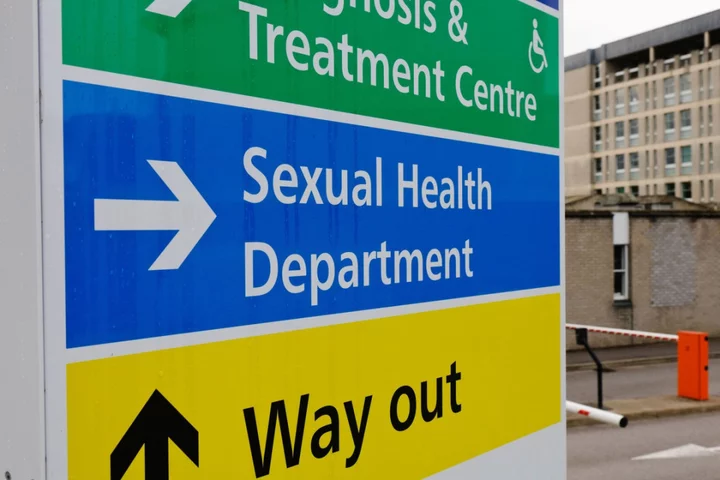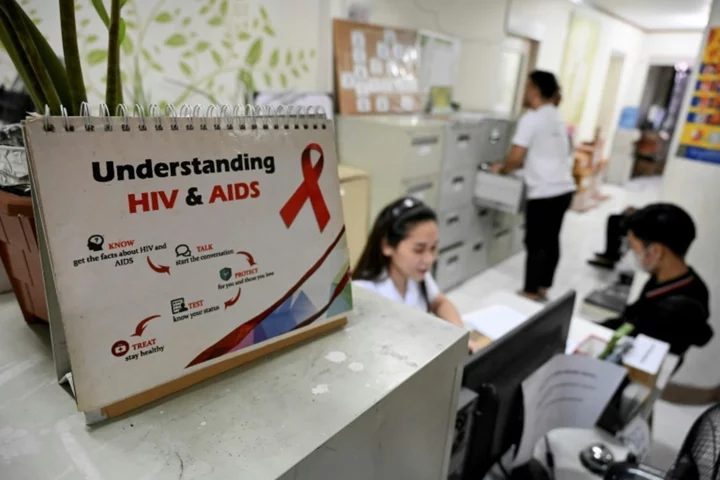
Learn how ChatGPT can work for you with this $20 online course
TL;DR: As of June 12, learn Introduction to ChatGPT for only $19.99 — a 75%
2023-06-12 17:52

These earbuds can translate 37 languages. They're on sale for $150
TL;DR: As of June 12, get the Mymanu CLIK S Award-Winning Translation Earbuds for only
2023-06-12 17:47

US Supreme Court's dog toy ruling puts parody products on notice
By Blake Brittain The U.S. Supreme Court handed brand owners a win against parody products on Thursday when
2023-06-12 17:20

Riverside Ukraine city left with mud and memories
Zaporizhzhia residents braved grey skies and driving rain to visit the banks of the Dnipro, not to relax in riverside bars and resorts, but to...
2023-06-12 16:55

STI cases at record highs: 6 things everyone needs to know about sexually transmitted infections
Cases of gonorrhoea in England have reached record highs, while syphilis cases are at the highest level since just after the Second World War, according to the UK Health Security Agency (UKHSA). Gonorrhoea diagnoses rose to 82,592 in 2022, an increase of 50.3% compared to 2021, while infectious syphilis cases increased to 8,692 in 2022, the largest annual number since 1948. As well as gonorrhoea and syphilis, it’s important to be aware of the risk around all sexually transmitted infections (STIs) including chlamydia, genital herpes, genital warts and HIV. As Dr Hamish Mohammed, consultant epidemiologist at UKHSA, pointed out: “STIs aren’t just an inconvenience – they can have a major impact on your health and that of any sexual partners.” Here, sexual health experts talk through what you need to know about STI prevention, testing and treatment… 1. Anyone can potentially get an STI “Don’t think that because you haven’t caught one in the past – or because you only sleep with people that you don’t think have STIs – that you are immune, because the truth is that no one is,” Sarah Mulindwa, a specialist sexual health nurse who is working with Lovehoney, told PA Media. Regardless of gender, sexual orientation, whether you have lots of partners or you’re in a monogamous relationship, anyone can potentially get an STI. And they affect all age groups, too. “There’s no upper age limit on getting an STI,” Julie Bowring, consultant gynaecologist in sexual and reproductive health at London Gynaecology, added. The number of common STIs caught among the over 65s in the UK increased by 20% from 2017 to 2019, according to the Local Government Association. This may in part be due to differences in health awareness. “When that generation of patients were at school, they didn’t get quite as good and comprehensive sexual health education as we get now,” Bowring said. “And if you look at all the media campaigns for sexual health infections, it’s usually targeted at a younger demographic.” 2. Not all contraceptives protect against all STIs “It’s a common myth that when you’re on regular contraception, you might have protection against STIs,” said Bowring. “I think that can sometimes be missing in information that’s given to patients when they start contraception.” While birth control methods such as the pill, coil or IUD will protect against unintended pregnancy, they won’t protect against STIs. “Condoms [or dental dams] are the only effective method of protecting against STIs if you are sexually active,” said Mulindwa. “And even then, only when you use them correctly: wearing one to cover the whole length of the penis, and using from start to finish of sex, including during oral, anal, or vaginal penetration.” 3. Symptoms can vary greatly With a wide range of symptoms that vary in severity, STIs can sometimes be difficult to spot. “Certain STIs, such as chlamydia for example, might not even present any symptoms in the person that has it,” Mulindwa explained. “If you are experiencing any form of discomfort in and around your genitals, then it is imperative that you get tested right away.” Other signs may include an unusual discharge from the vagina, penis or anus; pain when peeing; lumps or skin growths around the genitals or anus; a rash; unusual vaginal bleeding; itchy genitals or anus; and blisters, sores or warts around these areas. “It can be quite difficult for women to sometimes know when a symptom might be STI related,” added Bowring. “It could be their periods, it could be something non-STI related. If there is a risk of infection and you have noticed a change in either your discharge or your pain, then it is worth getting checked out.” 4. Routine testing is a good idea Because some infections don’t result in any symptoms, routine testing is important. “If you’ve changed partner then it’s a good idea, if you haven’t had STI screening, to attend your local service to get that done,” Bowring advised. Home testing kits are also available with swabs and finger-prick blood tests. “It’s recommended that you screen at least every six months for the most common infections – chlamydia and gonorrhoea – and yearly for blood tests to screen for HIV, syphilis, and hepatitis C,” Mulindwa added. “Depending on your risk factors, you may need to screen more frequently.” 5. Treatments are available STIs are extremely common and there’s no need to feel embarrassed or ashamed if you do catch one, and treatments are available. “The majority of STIs are curable, and even those that aren’t – for example, herpes – have treatments available to manage outbreaks,” said Mulindwa. “Some STIs like chlamydia are treatable with a course of antibiotics, and others require creams and ointments.” 6. Options for people with HIV have come a long way Thanks to scientific breakthroughs, providing they have access to treatment, most people with HIV will not develop any AIDS-related illnesses and can live full lives. “There are now options available that can stop HIV reproducing in the body and prevent you from passing it on, as well as drugs designed to prevent infection if you have been exposed,” said Mulindwa. “People who are HIV positive and are undetectable (which means the level of the virus is very low) are unable to pass it on even when they have unprotected sex.” A relatively new drug called Pre-Exposure Prophylaxis (PrEP) – designed to reduce the chance of contracting HIV – can be helpful for people who may be at increased risk. Health professionals at NHS sexual health clinics can talk you through the options for preventing and managing HIV. Read More Charity boss speaks out over ‘traumatic’ encounter with royal aide Ukraine war’s heaviest fight rages in east - follow live What’s wrong with my roses? Men’s Health Week: How to talk about sensitive or ’embarrassing’ health issues Prince William responds after three guardsman collapse during UK heatwave
2023-06-12 16:46

Chinese airline defends flight attendant weight restrictions after backlash
Chinese carrier Hainan Airlines has defended imposing weight requirements on flight attendants after reports of the new policy went viral on social media and sparked a public backlash.
2023-06-12 16:46

How to watch MrBeast's secret $1M merch video? Where to buy Feastables products?
MrBeast announced that he had recorded a secret video that is not available anywhere at the end of his latest yacht video
2023-06-12 16:26

Harry Styles pauses concert to assist fallen fan
Harry Styles brought his 'Love On Tour' jaunt to Ireland at the weekend.
2023-06-12 16:22

Tony Awards 2023 worst-dressed celebs: From Lupita Nyong'o's breastplate to Jordan Roth's scarlet cloak
Here are top-10 fashion blunders from 2023 Tony Awards red carpet
2023-06-12 16:21

Drought hits Bishkek, where taps are running dry
For the past month, Bishkek resident Kanychai Bakirova has lived with her family of 11, including young children, in a home with only a trickle...
2023-06-12 16:18

Men’s Health Week: How to talk about sensitive or ’embarrassing’ health issues
Unsure how to approach a sensitive health conversation with your partner? While there shouldn’t be any shame around health issues, it can feel tricky raising concerns about your partner’s health – especially if it involves something perceived as being ‘embarrassing’ or sensitive. This can particularly apply to men: a survey commissioned by the app myGP last year found one in four men (23%) refuse to seek medical advice about a health issue due to embarrassment. But, what if you’re the partner of a man who may need to tackle a health issue, but you’re nervous about how to bring the topic up? First off, men’s health and sexual function specialist Dr Anand Patel, advisor to Eroxon, says being able to have these conversations in relationships is important. “It is the unsaid conversations that cause the most stress in relationships,” says Patel. “If you have a partnership where you can communicate your needs and stresses on a regular basis, you are probably going to have a really functioning relationship.” So, whether you’re in a heterosexual or same-sex relationship, how do you go about it? “These talks are important to have in a kind manner,” says Patel. “Don’t blindside them, don’t catch them off-guard. It is about helping with the health of each other.” As Men’s Health Week (June 12-18) begins, here are three common men’s health problems, and advice on how to talk to your partner about them… Toilet habit changes Have you noticed that your partner’s toilet habits have altered? Patel says this could include them “having difficulty passing urine, running to the toilet all the time, or getting up a lot in the night” to pee. This can be very common, particularly as men get older, and it is often linked to the prostate (a small gland, located near the bladder, which helps make semen). An enlarged prostate can affect urination, and while this is usually caused by a harmless condition called benign prostate enlargement (BPE), it can sometimes be a symptom of cancer so it’s important to get it checked out by a doctor. Plus, there are treatments that can help – it isn’t something men need to just live with. But how do you raise the conversation if someone seems reluctant to talk about it? “I would suggest having an idea in your head of what you want to say. Speak in a private place, where they have not just got back from work or are rushing out,” says Patel, who suggests approaching it by saying: ‘Can we catch up about something that has been on my mind?’ “Keep an even tone, even if you are annoyed you are being kept up at night. This might be a bit embarrassing, signpost that, then discuss how it affects you and explain you are worried about them.” Erectile dysfunction Erectile dysfunction (ED) is very common and often nothing to worry about if it only happens occasionally and there’s an obvious cause. But sometimes it can be more of a frequent problem – and Patel says it’s important for people to be able to talk about it in relationships. He explains: “It could be a sign of health issues. Perhaps due to anxiety, depression, work, grief, stress, or a health condition” – such as diabetes or a heart problem. Erectile dysfunction can be a sensitive topic, however. When it comes to discussing it with your partner, Patel suggests: “Pick a good place and time – not after sex. Signpost that it is not a blame thing. Explain that you still enjoy what you do together, but have noticed differences. Ask how he is feeling and whether the problem is something you can work on together. Say what you need to say, but do it kindly.” Remember, GPs hear about ED all the time and there are lots of effective treatments. “Many current treatments don’t involve the partner at all; he shuffles off and deals with it, be it through tablets or a pump,” says Patel. “Whereas if you are able to engage with foreplay, you can use something to improve the situation together, such as Eroxon [treatment gel]. The topical nature of the gel means you can get your partner fully involved with some manual stimulation too.” A lump on their testicles You are having sex with your partner and come across a lump. Now what? “Perhaps don’t say there is a lump when you are having sex – bring it up another time soon after, and don’t delay,” suggests Patel. However, he stresses that this “could be an urgent conversation”. Patel adds: “Maybe it is [a lump] they have known about for years that is nothing to be worried about, but you should ask. Once you have said something, be quiet and give them some time. They could be feeling angry, embarrassed, shocked, or confused about how you might feel. If they say they don’t want to speak to a doctor, try to work out why. Make it clear you are worried.” A lump doesn’t always mean cancer. However, this is a possibility – testicular cancer is the most common form of cancer in men aged between 15-49, according to the NHS – so it’s important to get any unusual lumps and bumps checked out quickly. Testicular cancer be often be successfully treated, but detecting it early does help. “Sometimes you have to mention cancer to make someone take an issue seriously,” says Patel. “You may want to be kind, but you cannot avoid the fact they might have a problem.” Read More Charity boss speaks out over ‘traumatic’ encounter with royal aide Ukraine war’s heaviest fight rages in east - follow live Prince William responds after three guardsman collapse during UK heatwave Chanel’s classic 1926 little black dress added to fashion exhibition in Scotland 6 innovative self-tan products to help you get your best-ever faux glow
2023-06-12 15:56

Dogs die as South Africa snake antivenom shortage bites
Zarza, a much-loved Staffordshire terrier, ended up at a South African animal hospital with a bite from a Mozambique spitting cobra...
2023-06-12 14:59
You Might Like...

Bojangles Introduces Not One, But Two New BBQ Versions of Beloved Chicken Sandwich for a Limited Time Only

Hayao Miyazaki's 'The Boy and the Heron' gets stunning first trailer

Over-30s eye Australia gap year as age limit raised

'Bob Marley: One Love' biopic trailer examines reggae icon beyond the marijuana and music

Scientists Transmit Space-Based Solar Power to Earth For First Time

Putin, Erdogan Talks End Without Reviving Ukraine Grain Deal

The Best Language Learning Apps for 2023

Poor education, stigma fuel Philippines' soaring HIV infections
